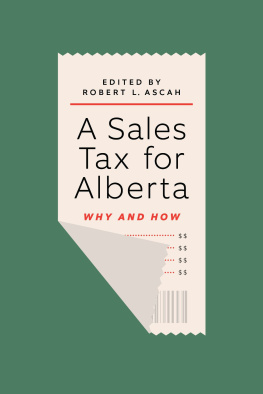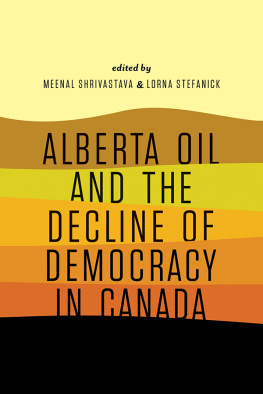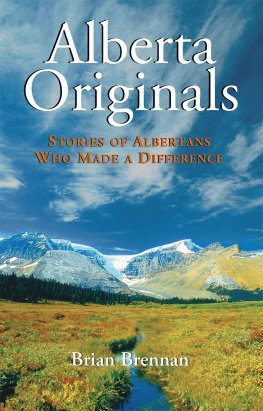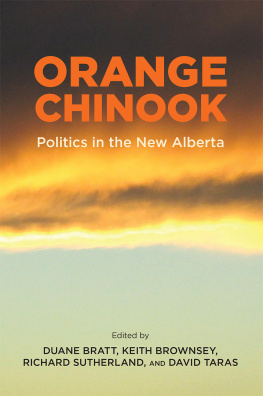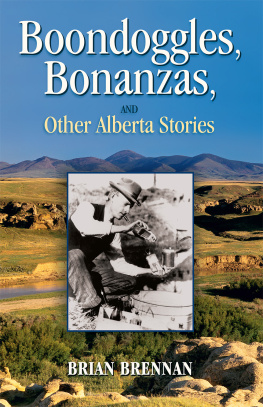GODS PROVINCE
Gods Province
Evangelical Christianity, Political Thought,
and Conservatism in Alberta
CLARK BANACK

McGill-Queens University Press 2016
ISBN 978-0-7735-4714-8 (cloth)
ISBN 978-0-7735-9930-7 (ePDF)
ISBN 978-0-7735-9931-4 (ePUB)
Legal deposit second quarter 2016
Bibliothque nationale du Qubec
Printed in Canada on acid-free paper that is 100% ancient forest free (100% post-consumer recycled), processed chlorine free
This book has been published with the help of a grant from the Canadian Federation for the Humanities and Social Sciences, through the Awards to Scholarly Publications Program, using funds provided by the Social Sciences and Humanities Research Council of Canada.
McGill-Queens University Press acknowledges the support of the Canada Council for the Arts for our publishing program. We also acknowledge the financial support of the Government of Canada through the Canada Book Fund for our publishing activities.
Library and Archives Canada Cataloguing in Publication
Banack, Clark, 1981, author
Gods province : evangelical Christianity, political thought, and conservatism in Alberta / Clark Banack.
Includes bibliographical references and index.
Issued in print and electronic formats.
ISBN 978-0-7735-4714-8 (hardback). ISBN 978-0-7735-9930-7 (ePDF).
ISBN 978-0-7735-9931-4 (ePUB)
1. Christian conservatism Alberta History 20th century. 2. Conservatism Religious aspects Christianity History 20th century. 3. Politicians Religious life Alberta History 20th century. 4. Christianity Alberta History 20th century. 5. Religion and politics Alberta History 20th century. 6. Alberta Religion 20th century. 7. Alberta Intellectual life 20th century. 8. Alberta Politics and government 20th century. I. Title.
FC3674.2.B35 2016 | 320.5209712309'045 | C2016-900336-1 |
C2016-900337-X |
This book was set by True to Type in 10.5/13 Sabon
For Kendell and Brynn. Thank you.
Contents
Tables
Acknowledgments
This project began as a PhD dissertation at the University of British Columbia (UBC), and I would like to thank those individuals who assisted me in these early stages. My supervisor, Philip Resnick, and committee members Allan Tupper and Barbara Arneil were especially helpful in this regard, continually pushing me on a number of fronts to make this study better. Paul Burns, Gerald Baier, and external examiner Trevor Harrison also took the time to participate in the final stages and made several critical suggestions that helped mould this manuscript into its current form. I also owe thanks to those who read and commented on different sections of the dissertation, sat through my many conference presentations, or engaged in helpful conversations with me along the way. This list includes, but is not limited to, Roger Epp, Jim Farney, David Rayside, Jared Wesley, and David Goa and the broader community associated with the Chester Ronning Centre for the Study of Religion and Public Life housed at the University of Albertas Augustana Campus. Finally, to my former professors at UBC and the good friends I made while working through graduate school: you ensured that my time at UBC was intellectually fulfilling and immensely enjoyable and that my dissertation was made better because of this.
I would also like to express my gratitude to the many librarians and archivists who were patient and helpful with the requests I made at each of the archives visited over the course of this study. The current and recently retired politicians from Alberta who took the time to speak with me, many of whom requested anonymity because of the personal nature of the topic, were also supremely open and accommodating. Preston Manning, in particular, patiently sat through two lengthy interviews and allowed me access to a number of helpful documents.
I would also like to thank those who supported the completion of this project financially. They include UBCs graduate fellowship program, the Department of Political Science at UBC, the Department of Political Science at York University, SSHRCs Awards to Scholarly Publications Program, and Rod Kay, Blue Lefebvre, and the boys from the SGS Imperial Oil Rail Yard who provided an unlikely but much appreciated source of funding, as well as camaraderie, over the course of my stay in Edmonton.
This work was significantly revised while I was a member of the Department of Political Science at York University, and I would like to acknowledge the opportunity department members gave me to continue working in this field while completing this project. Dennis Pilon and Gabrielle Slowey stand out as two very helpful colleagues from York whose support over the past years is much appreciated.
I must also acknowledge the fine work of the many contributors from McGill-Queens University Press who added so much to this project. Kyla Madden, in particular, was a consistent source of both positive energy and critical advice while shepherding me through this process with great skill and efficiency. And a significant debt of gratitude is also owed to the three individuals who reviewed this manuscript and pushed me on several fronts to make this a much better work. Of course, all errors in fact and interpretation are mine alone.
My thanks as well to the University of Toronto Press and the Journal of Canadian Studies for allowing me to reprint aspects of my work that initially appeared in
Banack, Clark, American Protestantism and the Roots of Populist Conservatism in Alberta, in J. Farney and D. Rayside, eds, Conservatism in Canada (University of Toronto Press, 2013), 23148.
Banack, Clark, Conservative Christianity, Anti-Statism and Albertas Public Sphere: The Curious Case of Bill 44, in S. Lefebvre and L. Beaman, eds, Religion in the Public Sphere: Canadian Case Studies (University of Toronto Press, 2014), 25774.
Banack, Clark, Evangelical Christianity and Political Thought in Alberta, Journal of Canadian Studies 48, no. 2 (Spring 2014): 7099.
Finally, I offer deeply felt thanks to my parents Larry (whose incessant newspaper reading generated my interest in politics while I was still a boy) and Linda, my sister Candace, my grandmothers Luella and Olga, and my in-laws Robert and Carrie, who have consistently offered support and encouragement over the course of many years while I have chipped away at this project. To Kendell, words cannot capture the debt I have incurred for the love and patience you have demonstrated while being asked to shoulder such a heavy burden while I pursued this career. And to Brynn, thank you for bringing a smile to my face so many times each and every day.
GODS PROVINCE
1
Introduction
The political history of the Canadian Prairies is one of vigorous regional protest, non-traditional party formation, unprecedented policy experimentation, and a more general populist culture that has repeatedly emphasized the moral and intellectual capacity of the common man. Of course, much scholarly ink has been spilled by social scientists in an attempt to analyse this unique tradition of thought and protest that saw the growth of a number of diverse political movements, each seeking to rectify real (and sometimes imagined) economic and political injustices. Yet this backdrop remains largely unexamined by students of Canadian Prairie politics and populism.
This is especially so for the province of Alberta, which has received considerable academic attention over several decades from those eager to explain the long-running dominance of political parties that emphasize an anti-statist sentiment that has consistently encouraged both a populist and decidedly anti-socialist approach to its politics. Although many of these studies have been quite insightful, they have been nearly unanimous with respect to their silence on the influence of religion. Surely the impact of political and economic conditions related to the provinces initial quasi-colonial status within Confederation, its distinct immigration patterns, and its economic reliance on particular natural resources (and the immense wealth these resources have generated) are critical to understanding Albertas political development. However, as this book will demonstrate, religious interpretation remains an influential underlying factor that also helps to explain the long-running emphasis on populist democracy and the consistent aversion to redistributive economics that one finds in the policies and rhetoric of the provinces dominant political parties.
Next page



